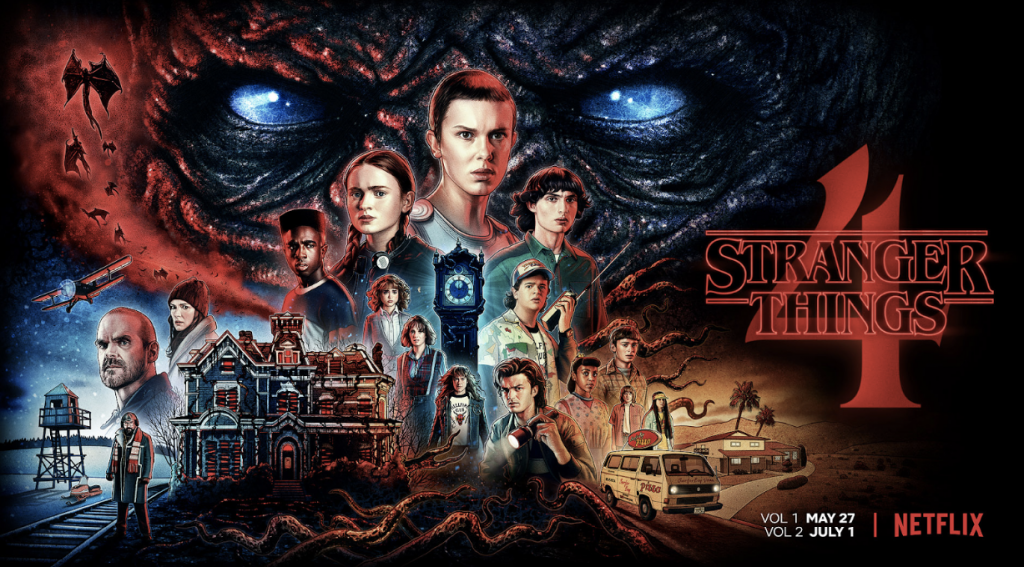Why TV Shows Need Writer’s Rooms

Molly Kurpis ‘25 / Emertainment Monthly Staff Writer
To create a television show is to follow the extended journey of characters as they grow and overcome the worlds they were built into. TV universes are usually more complex than those of films. There is more time to develop meaningful storylines and relationships. To really create something worthwhile is to be able to approach the subject matter from all sorts of angles, challenging the characters and their personalities between themselves and the story at hand. Unraveling new and exciting ideas that shock the audience are what make for the most compelling and entertaining shows.
Yet the world of a television show is massive: it is difficult, if not impossible, for one person to come up with every twist, every character arc and every defining moment. To rule a universe alone is to leave out most of its mysteries. Having a writer’s room opens the doors for a larger universe: writers’ stories and perspectives can work to grow and challenge the story in ways never thought of before. There is beauty, and there is success, in collaboration. This article will evaluate the success and the writing from three different TV seasons that came out within the past year; Succession Season 3, Stranger Things Season 4, and Euphoria Season 2.

Jessie Armstrong’s Succession is one of the most popular television shows of the 2020s. While being streamed on HBO Max, the fifth most popular streaming service in the world (roughly 85 million subscribers worldwide), Succession isn’t just successful for its platform. The show is a masterfully written story that explores power, greed, and success in a family-run business; what it means to be a killer, and what it means to survive. Each character is compelling, engaging, and real. Each episode of each season brings something new to the table, testing the Roys in unique and engaging ways. Characters are forced out of their comfort zones and make decisions that unravel layers of their ever-growing personalities. Relationships are mended and shattered as the universe expands within each season.
Having a writer’s room invites the imagination of Succession to other acclaimed writers, with stories and experiences different from the show’s creator. Ideas are exchanged, mistakes are noted, and the story evolves as each person brings something new to the table. Armstrong speaks highly of a writing room in an interview with The New Yorker, in which he discusses research, brainstorming, equality (a writing room filled with both men and women, British and American), and the process of creating the powerhouse scripts for each season. Writers discuss their lives, their family history and relationships, weaving their reality into their show. The nuanced storylines and perceptions threaded within Succession are amassed from the surge of creative writers stringing the story along in thrilling and unconventional ways. Each season brings something else for the characters to tackle. The last season of Succession premieres on March 26th; the writer’s last hurrah for ending their phenomenal universe.

The Duffer Brothers Stranger Things universe has been expanding for years. Since its first season in 2016, the series has surged in popularity and fame. The most recent season of Stranger Things streamed on Netflix in 2022; the most popular streaming service platform at the time (225 million subscribers worldwide). The show’s popularity resides in its massive cast, its dynamic characters and worldbuilding that draws the audience to the Upside Down, an alternate dimension that mirrors reality. This universe is constantly evolving throughout each season. As the main characters grow, so too does the world they interact with. While most episodes are written by the Duffer Brothers themselves, the show does utilize a writer’s room, brainstorming and bouncing ideas off one another to add new and exciting layers to the Upside Down.
Yet some of the Stranger Things writers get their own episodes: in Season 4, writer Paul Dichter wrote episode four. Chapter 4: Dear Billy became the most popular episode of the entire season – characters are challenged, new relationships are formed, time is lost, and death sits around the corner as the antagonist comes strikingly close to killing a main character. Along with Kate Bush’s Running Up That Hill topping music charts once again, Dear Billy is praised as one of the show’s best episodes for all it does to explore the already established plot and characters in new and fascinating lights. This alone goes to show the impact a writer’s room has on the success of television shows. The more perspectives considered, the more chances for a show to be expanded and explored in new lights.

Sam Levinson’s Euphoria has taken quite a controversial turn since its first season. There is a substantial difference in the writing between the first season and the second season. Although both season one and season two’s screenplays were solely written by Levinson, a few of season one’s episodes were directed by different people, offering different perspectives on how to shoot and portray the characters at hand. The writing, as a result, was likely altered from this shift in power. Yet Levinson took on the entire show itself in season two; both writing and directing. And it shows – season one followed a trivial pattern of introducing a character, showing their relationships and personalities, and eventually demonstrating the link back to the main character. Each character is given a deep dive, and their personalities are able to shine through.
Euphoria is a show built on its characters – whatever they do and whatever they say determines the plot and the direction the show takes. Season one acknowledges that, and unravels its characters in fun and nuanced ways. Season two, on the other hand, is not nearly as successful. The characters become boring and one-dimensional. A lot of them haven’t grown since the first season, or have no purpose in the show at all. Any chance of change or challenge is lost to confused writing, contradictions, and overall little to no change to the first season. The formula followed in the first season is acknowledged, and then completely lost in the second half of the second season. It is pretty clear Euphoria is written by one person – the fact that the characters have become so stagnant (and some of them lost completely) goes to show how beneficial a writer’s room is to a television show’s success.